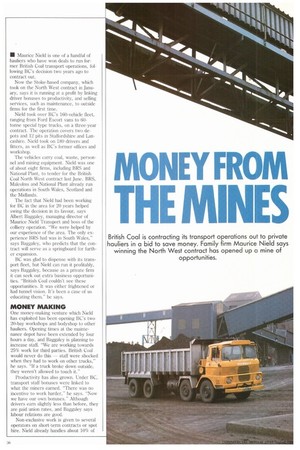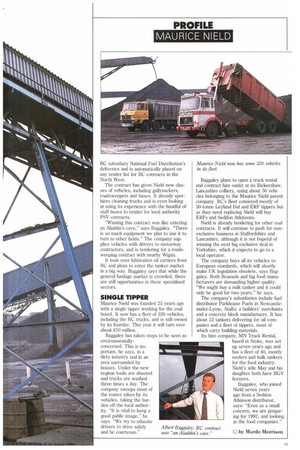MONEY FROM
Page 38

Page 39

If you've noticed an error in this article please click here to report it so we can fix it.
THE MINES
• Maurice Nield is one of a handful of hauliers who have won deals to run former British Coal transport operations, following BC's decision two years ago to contract out.
Now the Stoke-based company, which took on the North West contract in January, says it is running at a profit by linking driver bonuses to productivity, and selling services, such as maintenance, to outside firms for the first time.
Nield took over BC's 160-vehicle fleet, ranging from Ford Escort vans to 60tonne special type trucks, on a three-year contract. The operation covers two depots and 12 pits in Staffordshire and Lancashire. Nield took on 180 drivers and fitters, as well as BC's former offices and workshop.
The vehicles carry coal, waste, personnel and mining equipment. Nield was one of about eight firms, including BRS and National Plant, to tender for the British Coal North West contract last June. BRS, Malcolm and National Plant already run operations in South Wales, Scotland and the Midlands.
The fact that Nield had been working for BC in the area for 20 years helped swing the decision in its favour, says Albert Baggaley, managing director of Maurice Nield Transport and boss of the colliery operation. "We were helped by our experience of the area. The only experience BRS had was in South Wales," says Baggaley, who predicts that the contract will serve as a springboard for further expansion.
BC was glad to dispense with its transport fleet, but Nield can run it profitably, says Baggaley, because as a private firm it can seek out extra business opportunities. "British Coal couldn't see these opportunities. it was either frightened or had tunnel vision. It's been a case of us educating them," he says One money-making venture which Nield has exploited has been opening BC's two 20-bay workshops and bodyshop to other hauliers. Opening times at the maintenance depot have been extended by four hours a day, and Baggaley is planning to increase staff. "We are working towards 25% work for third parties. British Coal would never do this — staff were shocked when they had to work on other trucks," he says. "If a truck broke down outside, they weren't allowed to touch it."
Productivity has also grown. Under BC, transport staff bonuses were linked to what the miners earned. "There was no incentive to work harder," he says. "Now we have our own bonuses." Although drivers earn slightly less than before, they are paid union rates, and Baggaley says labour relations are good.
Non-exclusive work is given to several operators on short-term contracts or spot hire. Nield already handles about 10% of BC subsidiary National Fuel Distribution's deliveries and is automatically placed on any tender list for BC contracts in the North West.
The contract has given Nield new classes of vehicles, including gullysuckers, roadsweepers and buses. It already spothires cleaning trucks and is even looking at using its experience with the handful of staff buses to tender for local authority PSV contracts.
"Winning this contract was like entering an Aladdin's cave," says Baggaley. "There is so much equipment we plan to use it to turn to other fields." The company supplies vehicles with drivers to motorway contractors, and is tendering for a roadsweeping contract with nearby Wigan.
It took over lubrication oil carriers from BC and plans to enter the tanker market in a big way. Baggaley says that while the general haulage market is crowded, there are still opportunities in these specialised sectors.
Maurice Nield was founded 25 years ago with a single tipper working for the coal board. It now has a fleet of '320 vehicles, including the BC trucks, and is still owned by its founder. This year it will turn about 210 million.
Baggaley has taken steps to environmentallyconcerned. This is important, he says, in a dirty industry and in an area surrounded by houses. Under the new regime loads are sheeted and trucks are washed three times a day. The company sweeps most of the routes taken by its vehicles, taking the burden off the local authority. "It is vital to keep a good public image," he says. "We try to educate drivers to drive safely and be courteous." Baggaley plans to open a truck rental and contract hire outlet at its Bickershaw, Lancashire colliery, using about 50 vehicles belonging to the Maurice Nield parent company. BC's fleet consisted mostly of 30-tonne Leyland lid and ERF tippers but as they need replacing Nield will buy ERFs and Seddon Atkinsons.
Nield is already tendering for other coal contracts. It will continue to push for nonexclusive business in Staffordshire and Lancashire, although it is not hopeful of winning the next big exclusive deal in Yorkshire, which it expects to go to a local operator.
The company buys all its vehicles to European standards, which will shortly make UK legislation obsolete, says Baggaley. Both Brussels and big food manufacturers are demanding higher quality. "We might buy a milk tanker and it could only be good for two years," he says.
The company's subsidiaries include fuel distributor Parkhouse Fuels in Newcastleunder-Lyme, Staffs; a builders' merchants and a concrete block manufacturer. It has about 12 tankers delivering for oil companies and a fleet of tippers, most of which carry building materials.
Its hire company, MN Truck Rental, based in Stoke, was set up seven years ago and has a fleet of 40, mostly reefers and bulk tankers for the food industry. Nield's wife May and his daughter both have HGV licences.
Baggaley, who joined Nield seven years ago from a Seddon Atkinson distributor, says: "Even as a small concern, we are preparing for 1992, and looking at the food companies."


































































































































